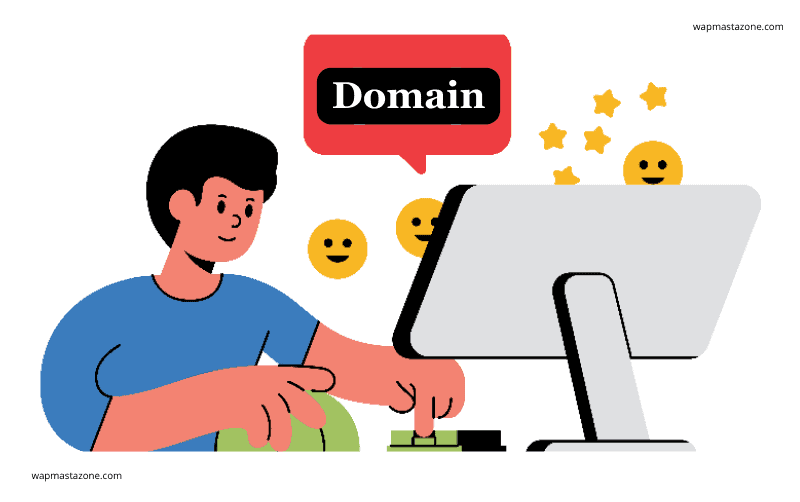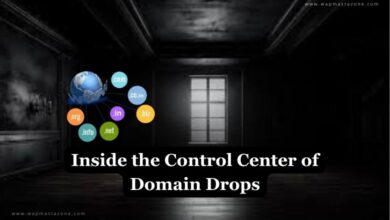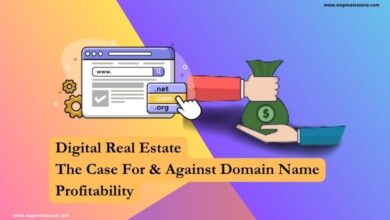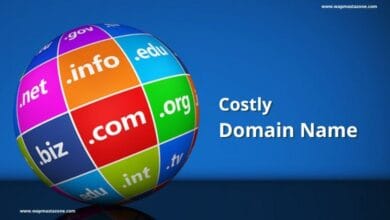
In this article, I cover Commonly used Domain keywords, keyword in domain and domain name keywords you can learn about and also use for your article ides. This article is good for anyone in the domain industry.
A domain name is a human-readable and memorable label that is used to identify a specific location on the internet. It serves as an address for websites and other resources on the World Wide Web. A domain name is part of the larger Domain Name System (DNS), which is a hierarchical system that translates human-readable domain names into IP addresses, allowing computers to locate and connect with each other on the internet.
A typical domain name consists of two main parts:
– Second-Level Domain (SLD): This is the main part of the domain name, representing the specific name chosen by the individual or organization. For example, in the domain name “example.com,” “example” is the second-level domain.
– Top-Level Domain (TLD): This is the rightmost part of the domain name and typically indicates the type or category of the website or organization. Common TLDs include “.com,” “.org,” “.net,” “.gov,” and many others. In the example “example.com,” “.com” is the top-level domain.
42 Commonly used Domain keywords

1. Domain Name:
A domain name is a human-readable and user-friendly label that is used to identify a specific location or resource on the internet. It serves as an address for websites and other online services. Instead of using numerical IP addresses to locate and access websites, users can use domain names, which are easier to remember.
2. Subdomain:
A secondary domain that is part of a larger domain. For example, “blog.example.com” is a subdomain of “example.com.”
3. Domain Authority:
Domain Authority is one of the domain name keywords and it is otherwise known as DA and it is a search engine ranking metric developed by Moz that predicts how likely a website is to rank in search engine result pages. DA is a process of evaluating a website’s ranking on a scale of 0 to 100, with 100 being the highest possible score.
Also read: 7 Proven Steps To Grow Your Domain Authority
4. Domain Flipping:
Domain flipping is the practice of buying and selling domain names for a profit. The goal is to acquire a domain name that is likely to be in demand in the future and then sell it for a higher price. This is otherwise known as digital real estate. While it is a relatively simple concept, there is a lot of strategy and research that goes into successful domain flipping. This can be a newly registered domain or a re-registered expired domain which has been valued to be valuable.
Recommended: Complete Guide to Domain Flipping
5. Domain BackOrder:
Domain backorder is a service designed to assist you in acquiring a specific domain name you desire by attempting to purchase it for you once it becomes available for registration. By engaging in this practice, you have the advantage of being one of the first individuals offered the opportunity to register your desired domain name immediately after it expires, before anyone else gets the chance.
Recommneded: Ultimate Guide to Domain Backorder
6. Back Order Service:
A service offered by registrars allowing users to place a request for a domain name that is about to expire or become available for registration.
7. Domain Monitoring:
Domain monitoring is one of the popular domain keywords that observes and records changes in the domain settings of a designated domain. It is essential to monitor changes in certain domain settings as they may provide an indication of when your desired domain name will be available for registration and purchase once again. When you place a domain backorder, domain monitoring is automatically included and will send you email notifications whenever significant changes occur in the domain settings of your desired domain. Below is an interface of GoDaddy backorders and monitoring service.
8. Expired Domain:
A domain is considered expired if the domain is not renewed by its owner before the registration period lapsed. Domain names are typically registered for a specific duration, commonly one year, and owners need to renew the registration to retain control and ownership of the domain.
Recommended: The Myth of Domain Expiration
9. Domain Expiration Grace Period:
A brief period after a domain has expired during which the owner can still renew it without losing ownership. The grace period varies among registrars.
10. Domain Renewal Alert:
A Domain Renewal Alert is a notification or reminder sent to the owner of a domain name to inform them that the domain registration is set to expire soon. Domain names are typically registered for a specific period, commonly one year, and they need to be renewed to maintain ownership and continue using the domain.
11. Domain Auction:
A domain auction is one of the popular domain keywords that refers to an event where internet domain names are sold to the highest bidder. It is also regarded as s a marketplace for domain sellers and potential buyers. Domain names are the web addresses that people use to find and access websites on the internet. They can be made up of letters, numbers, and symbols, and can be registered by anyone who wants to create a website or online presence. However, some domain names are more valuable than others, depending on factors such as their length, relevance, and popularity.
Related: Domain Auction and Domain Bidding Process
12. Domain Bidding:
Domain bidding is a process where individuals or entities compete to acquire ownership of a specific domain name by placing bids on it. This typically occurs in domain auctions, which can take various forms.
13. Domain Transfer:
The process of moving a domain name from one domain registrar to another. This may involve changing the registration details and DNS settings.
14. Domain Registration:
The process of securing the rights to use a specific domain name for a defined period by paying a registration fee to a domain registrar.
15. Domain Hosting:
The service of providing server space and resources to store and manage the files, data, and content associated with a domain name.
16. Domain Lock:
A security feature that prevents unauthorized transfers or modifications to a domain name. It adds an extra layer of protection to prevent domain hijacking.
Also read: How to Find a Domain Name
Suggested read: 14 Ultimate Tips for Domain Name Selling & Buying
17. Domain Registrar:
Domain registrar is one of the popular domain keywords that refers to a company or organization authorized to manage the registration of domain names on behalf of domain owners. Below are the most popular domain registrars:
18. Domain Owner:
It is one of the popular domain keywords that refers to the individual or entity that has registered and owns the rights to a specific domain name.
19. DNS (Domain Name System):
The system that translates human-readable domain names into numerical IP addresses, allowing computers to locate and connect to each other on the internet.
20. Top-Level Domain (TLD):
The highest level in the hierarchical domain naming system, such as .com, .net, .org. TLDs are categorized into generic TLDs (gTLDs) and country-code TLDs (ccTLDs).
21. WHOIS:
A protocol that provides information about the registration of a domain name, including details about the domain owner, registration and expiration dates, and DNS server information.
22. Domain Extension:
The suffix attached to the end of a domain name, indicating its type or purpose (e.g., .com, .org, .net).
23. Domain Squatting:
The unethical practice of registering, trafficking, or using a domain name with the intent of profiting from the goodwill of someone else’s trademark.
24. IDN (Internationalized Domain Name):
A domain name that includes characters from non-Latin scripts, allowing for domain names in languages other than English.
25. Parking Domain:
The temporary registration of a domain name without associating it with any specific website or content. It is often done for future use or resale.
Read also: Maximizing Your Startup’s Potential with a Premium Domain Name
Related: Most Expensive Domain Names – Top 500+
26. DNSSEC (Domain Name System Security Extensions):
A suite of extensions to DNS that adds an extra layer of security by digitally signing data to verify its authenticity.
27. Domain Forwarding:
Redirecting a domain name to another website or URL. This is often done when a user wants multiple domain names to lead to a single website.
28. Domain Appraisal:
It is one of the popular domain keywords that the process of estimating the value of a domain name, usually considering factors like market demand, length, and relevance.
29. Domain Privacy (WHOIS Privacy):
A service that hides the personal contact information of the domain owner from the public WHOIS database to enhance privacy and reduce spam.
30. Registry:
An authoritative database of all domain names registered within a particular top-level domain, managed by a registry operator.
31. ICANN:
A nonprofit organization responsible for coordinating and managing the global Domain Name System (DNS) and IP address space.
Also read: 6 Reasons Why you Should buy a Custom Domain
32. Domain Hijacking:
Domain hijacking, also known as domain theft, is a malicious act where an individual or entity unauthorizedly takes control of a domain name owned by someone else. This typically involves gaining access to the domain registrar account or exploiting vulnerabilities in the domain management system.
33. Domain IP lookup:
Domain IP lookup refers to the process of finding the IP address associated with a specific domain name. Every device connected to the internet, such as a website, server, or any networked device, is assigned a unique numerical label called an IP (Internet Protocol) address. This address is used for identifying and locating the device on the internet.
34. Domain Location:
could refer to the physical or geographical location of the servers hosting a particular domain or website. When someone accesses a website, their request is routed to a server that stores the website’s content. Or could be the registration location of a domain name. Every domain name is registered with a domain registrar, and the registration details include information about the domain owner, administrative contact, and registrar.
35. ccTLD (Country Code Top-Level Domain):
A specific type of TLD assigned to a particular country or territory, such as .us for the United States or .uk for the United Kingdom.
36. DNS Records:
Data stored in the Domain Name System that includes information about a domain’s configuration, such as IP addresses, mail servers, and other settings.
37. Domain Redirect:
A setup that automatically sends visitors from one domain to another. It is often used for rebranding or consolidating multiple domains.
Also read: How to Choose a Good Web Hosting for your Website or Business
Discover: Top Affiliate Programs to Join and Start Earning
38. Domain Reseller:
An individual or company that resells domain registration services, often purchasing domain names in bulk from registrars and offering them to customers.
39. EPP Code (Authorization Code):
A unique code required for initiating a domain transfer between registrars. It acts as an additional layer of security to ensure authorized transfers.
40. Domain Reputation:
A measure of the trustworthiness and reliability of a domain, often used by email providers to filter out spam. It is also a domain keywords that is influenced by factors such as email sending practices and website content.
Read also: Digital Real Estate – The Case For Domain Name Profitability
Also read: Top 15 Most Costly Domain Name
41. Domain Drops:
Domain Drops typically refers to domain names that have expired and are made available for registration again by the registrar. This can happen for various reasons, such as the owner forgetting to renew the domain, deciding not to renew it, or going out of business. When a domain expires, it goes through a process where it becomes available for registration by anyone on a first-come, first-served basis.
Suggested read: Inside the Control Center of Domain Drops
42. Domain Dropzone:
Dropzone provide Registrar partners with equal access to make domain applications for the list of expiring domain names on a given day. Applications are made on a first-come first-serve basis and awarded at the end of the dropzone period to successful applicants. At a scheduled time pre-indicated to registrars, RO will open the Dropzone allowing registrars begin submitting applications requests for domains scheduled for release that day.
Where Can I Buy Domain Names?
Once you have done proper research and evaluation, then you can prepare to buy the domain name. Ready to buy your domain name? We recommend the following domain name registrars; buy
How Much Does a Domain Name Cost?
The price for keeping a “.com” domain per year is between $8 – $20 as it varies from one domain registrar to the other. Below are the price from some top Domain Name registrars;
1. GoDaddy: GoDaddy.com – $19.99/year
2. Namecheap: NameCheap.com – $13.17/ year
3. HostGator: HostGator.com – $17.99/year
4. Domain: Domain.com – $8.99/year
To search and generate domain name ideas, use Free Domain Name Generator



